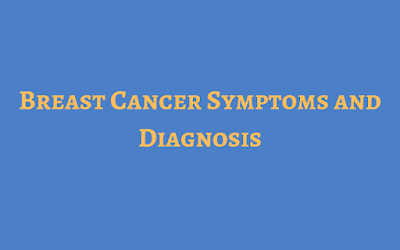What is Breast Cancer: Breast cancer is characterized by the uncontrolled growth of abnormal cells in the milk-producing glands of the breast or in the passages (ducts) that deliver milk to the nipples.
What are the 4 Types of Breast Cancer:
Types of breast cancer are illustrated as follows:- Ductal carcinoma in situ
- Invasive ductal carcinoma
- Inflammatory breast cancer
- Metastatic breast cancer
Metastatic breast cancer can be classified as Stage 4 breast cancer. The cancer starts to develop the other organs of the body.
How Does Breast Cancer Start: Changes or mutations in the DNA may cause the normal breast cells in order to become cancer. Certain changes in the DNA are passed on from parents (inherited) and can highly increase the risk for breast cancer. There are some other number of factors that have been shown to increase a woman’s risk of developing breast cancer:
Age: Most of the breast cancer cases appear in women who are over the age of 50.
Family history: If a female has a family or personal history of breast cancer she is more likely at the risk of developing breast cancer.
Clinical history: Women who previously suffered with benign breast cancer are at the higher risk of developing breast cancer in the future.
A late first pregnancy: Women who suffered from a late first pregnancy (over the age of 35 years) more likely occurred breast cancer.
Lifestyle factors: For instance, being overweight, physical inactivity, a high fat diet and high alcohol consumption could be responsible for developing breast cancer.
Symptoms and Diagnosis: The signs and symptoms of initial stage breast cancer may often go undetected. The common signs of breast cancer are summarised below:
- A rigid lump developing in the armpit or breast typically occurs painless on one side only.
- A change in the size or shape of the breast, including indentation, ‘growing’ (particularly prominent) veins or skin erosion.
- Changes in the skin include dimpling, bumps, hardening, redness or an orange peel like appearance.
- Changement in the nipple including retraction, the secretion of unusual discharge or a rash around the nipple area.
Breast Cancer Treatment: The treatment of breast cancer depends upon the size of the tumor, type of breast cancer, stage and grade of cancer and to determine whether the cancerous tissue is sensitive to hormones or not.
There are several treatment methods which are mentioned below:
- Breast surgery: In this case, either one of the breasts is removed or both breasts are removed according to the chances of metastasis of cancer cells.
- Radiation therapy: Radiation therapy is used to kill the cancerous cells with the help of a high energy beam. Radiation therapy is also used after the surgery to wipe out any left cancer cell.
- Chemotherapy: Chemotherapy is used to destroy fast-growing cancer cells with the help of a combination of different medications.
- Hormonal therapy: Hormone-blocking therapy is used in the treatment of breast cancer that is sensitive to hormones. This treatment method is effective against progesterone receptor-positive and estrogen receptor-positive cancers.
- Immunotherapy: This technique is used to strengthen the immune system of the body so that it can fight against cancerous cells with the help of drugs.
- Targeted therapy: This targeted therapy drugs used to treat breast cancer by blocking the normal functioning of Cancer cells. Ribociclib 200 mg is one of the most promising medication for the treatment of breast cancer.
What is Ribociclib Used For:
Ribociclib is indicated in combination with an aromatase inhibitor (such as letrozole) to treat HR-positive, HER2-negative metastatic or advanced breast cancer.It is a prescription medicine used in combination with a certain type of medicine as the first hormonal based therapy to treat women who have gone through menopause with hormone receptor (HR)-positive, human epidermal growth factor receptor 2 (HER2)-negative breast cancer that has spread to other parts of the body (metastatic).
Side Effects: The most common side effects of Ribociclib 200 mg Tablets in studies were decreased blood cell counts, mainly neutropenia, but also anemia. Gastrointestinal disorders were also common, for example, nausea and diarrhea, as was alopecia.The drug may also increase QT time and liver enzymes such as alanine transaminase, aspartate transaminase.
Read:- Medications which are helpful in the treatment of Multiple Myeloma

Thanks for picking out the time to discuss this, I feel great about it and love studying more on this topic. It is extremely helpful for me. Thanks for such a valuable help again. David Topper
ReplyDeleteWords will not be enough for me to appreciate Doctor Abolo of Abolospell@gmail.com who lives in Africa, for the successful spells he has been casting for me, I have never trusted any anybody, the way I trust him. This great dr was the one that saved my marriage. If you use him, I promise, you will trust him too. Any spell he cast for me is 100%. I see results the very same day. He also cured me from a deadly virus (HSV), a virus I have known as a medical, it doesn’t have a cure, he cured a patient I introduced to him to get pregnant after 15 years of marriage. He has active herbal remedies for diseases, infections and viruses. you can get him via; Email: Abolospell@gmail.com or you may decide to send him a msg on whatsapp here +27743411428. thanks doctor you are the best.
ReplyDelete